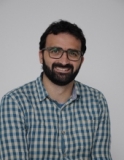The Executive Committee of the Young Academy of Spain has appointed Dr Fernando López-Gallego, Ikerbasque professor at CIC biomaGUNE, as a full member of the academy, along with another twelve young researchers from various fields. Fernando López-Gallego, who has a PhD in Molecular Biology, leads the Heterogeneous Biocatalysis Group at the Centre for Co-operative Research in Biomaterials CIC biomaGUNE; the group focusses its research on exploring the coupling of enzymes with solid materials.
This appointment follows a whole host of recognitions in the form of European projects which endorse the career of this young CIC biomaGUNE researcher. López-Gallego has a two-million-euro ERC Consolidator Grant from the European Research Council (ERC) to conduct research, over a five-year-period, into the manufacture of artificial cells capable of turning renewable raw materials into high-added-value products for the chemical industry. The laboratory is also working on a project within the Future and Emerging Technologies (FET-Open) programme of the European Commission; it is exploring the coupling of enzymes with magnetic nanoparticles capable of remotely modulating their catalytic activity in the presence of magnetic fields. He also has a networked training grant in the European Commission’s Marie Sklodowska-Curie programme, which seeks to equip researchers with the skills and international experience they need to develop a successful career on an academic as well as industrial level.
An independent, international committee made up of highly prestigious researchers encompassing various areas of expertise participated in the process to select the new full members of the Young Academy of Spain. 185 candidates applied for this call, so only 7% of the applicants were selected in what was a truly competitive process largely due to the excellent professional careers of the candidates. In addition to academic merits, other factors, such as the diversity of the candidates and the fields in which they work were also taken into consideration.
The Young Academy of Spain was set up in 2019 by seven Spanish researchers who are members of the Global Young Academy. Its aims feature promoting science as a professional option among young people by highlighting exceptional young scientists as role models; encouraging scientific skills by advancing scientific knowledge, research and innovation as the driving forces of economic development; encouraging the exchange of young researchers from different organisations at home and abroad; and acting as a forum and platform for young researchers to give them the chance to collaborate and contribute towards shaping knowledge advancement policies.
From next year onwards, 10 new members will be joining every year until there are 50 of them, which is the maximum number permitted according to the academy’s Articles of Association, as the appointment will have a 5-year duration. Since it was set up, the Young Academy of Spain has produced various reports which it has submitted to the Spanish Ministry of Science and Innovation about the development of new vaccines, the prevalence of SARS-CoV-2 in different settings and healthcare adequacy in Spain.

